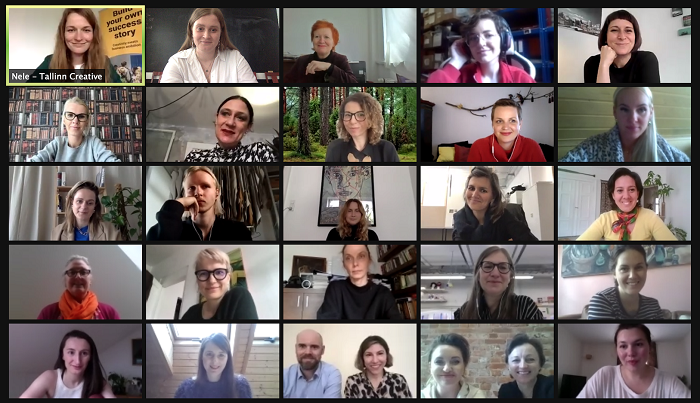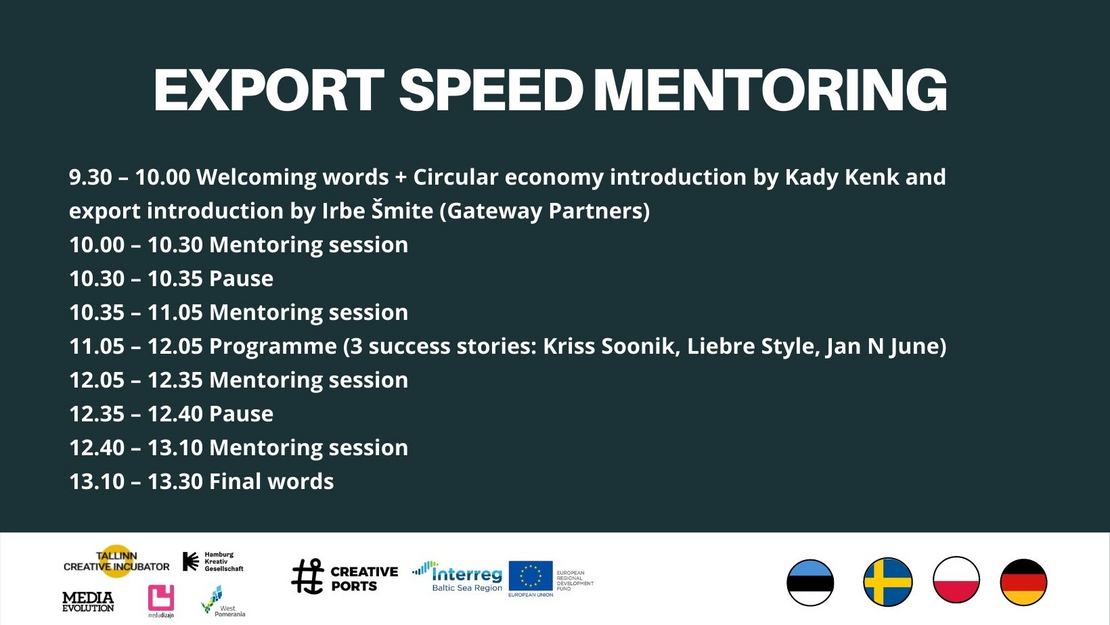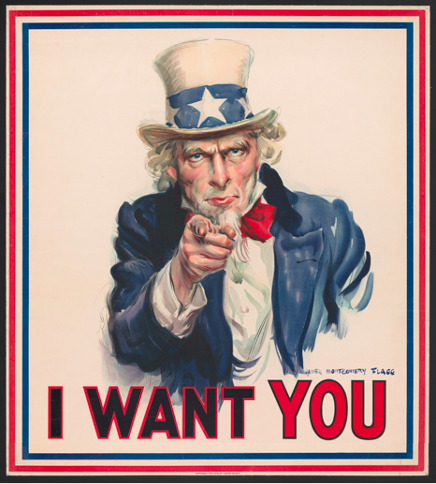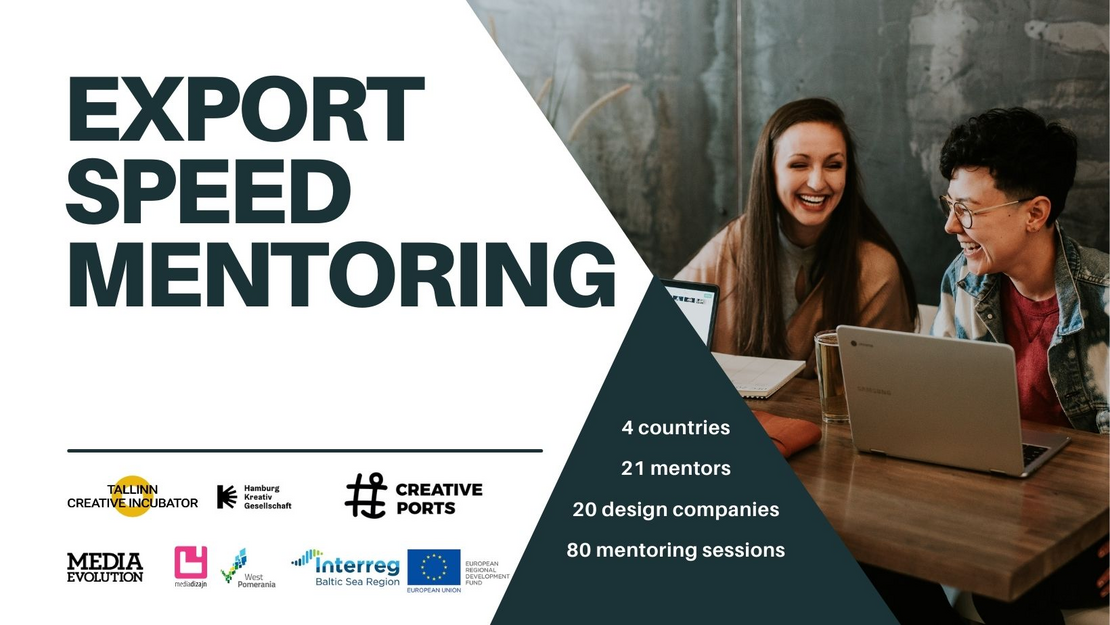Export Speed Mentoring
Do you want to increase the export capacity of CCI companies? The learning module guides you on how to organize an international Export Speed Mentoring event, by partnering with organisations from different countries.
Hosting Partner: Tallinn Business Incubators
Contact: Nele Plutus nele[at]inkubaator.ee
The learning outcomes for the module are:
- understand the key stages of organising event that brings together young creative companies and mentors from different countries to support the designers in entering new markets and learn about circular economy principles
- analyse the needs, the alignment between participants and mentors and the specific components of the program and its value for your organisation
- evaluate the challenges and opportunities related to the implementation of the case study Export Speed Mentoring
- apply the gained knowledge to develop your own idea for export speed mentoring format for growing internationalization capacity of CCI companies
- create the networks for cooperation between the CCI target group and mentors
The learning module is based on the internationalisation tool – Export Speed Mentoring
The general aim of Export Speed Mentoring was to support Baltic Sea Region designers in entering new markets and adapting sustainable principles. The event allowed young designers in the field of fashion to learn about internationalisation, different potential markets and get individual feedback from market experts.
Furthermore, Export Speed Mentoring’s goal was to enable all participating project partners to offer something and gain something. Each partner had its beneficiaries - designers who wanted to learn about other markets and each partner also had its givers - market experts that helped other country designers to assess their potential in a local market.
As environmental problems are becoming more critical in today's world and the fashion industry is not sustainable in its current form, it is inevitable that fashion companies must start changing their business models sooner or later- “change or die”. Export Speed Mentoring was designed to have a focus on making young designers think about sustainability and participants received individual feedback and ideas from circular economy experts about ways to make their business models more sustainable.
The learning material consists of How to guide about how to organise export speed mentoring event, including tips for all the stages of organization. The list of learning materials:
1. Need and format overview
2. Setting the target group
3. Establishing partnerships
4. Developing the program
5. Communication and preparation of the participants
6. Marketing the event
LEARNING MATERIALS
NEED
Entering a new market is usually a very time consuming and resource intensive process for young companies. In order to be successful, companies must first do their homework by analyzing and assessing different markets to identify the ones which could have the most potential for the business. Without market research, the companies can spend their resources in wrong directions and miss valuable opportunities.
The beginners often do not know what information they need and how to get started. They need guidance and there is always some local know-how and market insights that are not available online and are almost impossible to obtain without the help of local acquaintances or experts. In addition to that, finding information about competitive landscape, prices, marketing channels, customer purchasing behaviour and local taste is very much work for a company, whereas a person who is active in the industry can often give feedback and provide this information without any preparation.
Export Speed Mentoring enables intermediaries to help their creative companies to start taking their first steps in internationalization and exploring new markets.
FORMAT
Export Speed Mentoring is a one-day event, which brings together mentors and companies from 3-4 different countries. During the event, all companies will have individual mentoring sessions with market experts from other countries. The local market mentors will help participants to assess their business potential in a specific country and advise them on market entry strategies, product development, competitive landscape, and marketing possibilities.
EXAMPLE EXPORT SPEED MENTORING 2021:
Export Speed Mentoring brought together fashion design-makers and mentors from Estonia, Sweden, Poland, and Germany. This enabled each designer to receive feedback from three foreign market experts.
In addition to mentoring sessions, the program should also host different speakers, who could share their knowledge, experiences and success stories to inspire and encourage others to reach their goals.
EXAMPLE EXPORT SPEED MENTORING 2021:
Export Speed Mentoring hosted an export consultant who shared her experience of working with young fashion brands that are entering foreign markets and Kadi Kenk explained why brands today should reconsider their business models and adopt circular principles. The program also hosted three speakers, who shared their internationalization experiences and success stories to inspire and encourage others to reach their goals.
Export Speed Mentoring event format can be applied for different target groups. When choosing the target group, it is important that the selected group would not be too broad (e.g designers) and not too narrow (e.g. hat designers). If the target group is too broad, it is challenging to find experts who could be valuable for all participants and if the target group is too narrow then there will be too much competition between the designers and very challenging to get a good number of participants.
Export Speed Mentoring idea was first presented as targeting young design-makers, but after a short thought it was clear that the target group must be more specific. Thus, the organisers decided to target young fashion designers who work with clothes, shoes and bags.
In addition to that it is important to set some criterias for the participants, to evaluate their export readiness. If the company lacks the capacities and resources to start working on internationalization, then they will not benefit much from mentoring sessions, as they can not put their knowledge into practise.
Export Speed Mentoring criterias for design companies
We are looking for designers who have established themselves in the local market and want to expand their business internationally.
- It is rare that companies who do not have a functioning business in their local market will be successful abroad. Entering a new market requires many resources and investments, which a young designer does not have if she/he does not have a functioning business.
Products within fashion & accessories
- This was the event's target group. Fashion and accessories include clothes, bags, shoes etc. It was agreed that jewellery will not be included as it is harder to find mentors who would know about all those industries.
Capacity to increase the existing production volume
- When a company successfully enters a new market, then they will have an increase in purchases which will result in more production. If a company is working on its full production capacity and does not have a possibility to increase its production volume, then it is not possible to cater to those new clients.
Production within Europe
- There are many designers which are producing their products in low cost countries to have smaller operating costs. At the Export Speed Mentoring event we wanted to support the designers who are keeping the production within Europe and support the local economy.
At least one full-time worker
- Building an international business requires much time and resources. It is not something that a designer can usually do alone while having a side job etc.
Resources to invest in internationalization
- Going abroad means additional investments in marketing, transportation etc. All those activities require additional resources and designers must be prepared for this.
Online platform
- Good web page is a must for every business in today's world. It helps to establish a brand and is an important tool in marketing and sales processes.
English proficiency
- A designer entering a new market must speak foreign languages or have an employee, who can do that. Otherwise the communication is impossible. Export Speed Mentoring was in English and thus all participants had to speak English.
Based on the criterias set for the beneficiaries, the organizers must choose and develop the criterias for the mentors who could best help the designers to reach their goals.
Export Speed Mentoring criterias for mentors
We are looking for mentors who have an experience and good understanding of the local fashion & accessories industry and are ready to give new businesses feedback on entering their home market.
Experience and overview of the local fashion & accessories market
- When mentoring young fashion designers about a specific market, it is important that the expert would have a good understanding about the existing competitors, customer tastes, main events, news etc, otherwise the mentor must do much work on research to find the needed information.
Understanding of local consumer attitudes and purchasing behaviour
- As the aim of the event was to help the designers not only to introduce the products in a foreing market, but also sell it, it is important that the mentor would understand the local customers, their preferences and purchasing power.
Business/sales/marketing know-how within the industry
- In addition to understanding the local design market and customer preferences, the mentor should also understand how to make business and sell the products, because the designers first of all need practical advice on how to start and what to do.
English proficiency
- Export Speed Mentoring took place in English, thus it was important that the mentor could speak it.
It is advisable to have partners from 3-5 different countries. This will make it possible for each participant to get mentoring sessions from 2 - 4 country mentors. The main task of the partners is to to attract the participants and mentors from the local market, as well as give input for program development. Furthermore, each partner should pay remuneration for the mentors attracted from the local market.
When choosing the partners, it is important that they would understand the target group and have connections within the specific industry. Otherwise it can be hard to attract the right participants. Furthermore, for the organisation to benefit from the event, it is good if the participants are the direct beneficiaries of the organisation.
The selected countries should be attractive for the participants. It is normal that the brands are more interested in one or two participating companies, but if they are not interested in any of the markets, then it is hard to organize a successful event.
EXAMPLE EXPORT SPEED MENTORING 2021
Export Speed Mentoring was organized by 5 organisations who were from 4 different countries - Estonia, Poland, Germany and Sweden. Due to higher purchasing power Sweden and Germany are attractive markets for many brands, however the competitive landscape in those countries is very challenging. Estonia and Poland have been less interesting target markets due to their size and purchasing power, but as the living standard is increasing and those markets are often overlooked, there could be many interesting opportunities left undiscovered.
EXAMPLE EXPORT SPEED MENTORING 2021
The 4 selected countries enabled each brand to receive mentoring from 3 different foreign country mentors. In addition to that the organizers also included circular economy experts, who mentored on how to build a sustainable business. Thus each brand got in total 4 mentoring sessions.
EXAMPLE EXPORT SPEED MENTORING 2021
The partners who were included were involved in the creative sector within their country, but none of them had direct contacts nor experience with the fashion design industry. Thus it was very challenging for them to find the right participants for the event. In order to help them, different fashion design associations were contacted to reach the right audience.
EXAMPLE EXPORT SPEED MENTORING 2021
Export Speed Mentoring event was free for the young designers, but mentors received hourly fees for their participation. Each partner paid for their country mentors and decided on the remuneration themselves. However, Tallinn Creative Incubator gave some indicative prices and ideas on how to pay the mentors.
Program
At the beginning of the event, it is good to give the participants inspiration and thoughts which would help them take most of their mentoring sessions. There could be talks about things they could ask from the mentor or things they should consider when going abroad etc.. It is also a good chance for the organizers to go over all the organisational matters to be sure that everyone is on the same page.
It is also a good idea if the program would include success stories of other companies who have had the same journey. As there are many possible strategies and ways to go abroad, it is always good to learn from other people's experiences.
Mentoring sessions
Mentoring sessionsWhen the participants are prepared and know what are the main topics that they want to discuss during the individual mentoring sessions, then 30 minutes mentoring is sufficient. As the mentoring sessions are very intense for both parties involved, there should always be a 15 minutes break, after each session, which would enable the participants to write down the main takeaways and prepare for the next mentoring round.
EXAMPLES EXPORT SPEED MENTORING 2021
At the beginning of the Fashion Export Speed mentoring program, all participants got inspiration from Irbe Smite (Gateway&Partners) and Kadi Kenk (Let's Do it Foundation). Export consultant Irbe Smite shared her experience of working with young fashion brands that are entering foreign markets and gave young designers advice on what to consider when going abroad. Kadi Kenk explained why brands today should reconsider their business models and adopt circular principles, as well as introduce circular principles.
Networking
Besides the mentoring sessions which bring together mentors and companies, there should also be opportunities for people to interact with each other. As the participants are active within the same industry, the event can be a good chance for them to make valuable contacts.
When the event takes place in Zoom, then networking is much more challenging in comparison to live events, where the networking can take place during the coffee breaks. One of the easiest ways to enable contact sharing is to ask all participants whether they are ok with sharing their Linkedin profiles and contacts with others and create a list which can be shared among all participants.
To make everyone included, the organizers could make use of MIRO interactive whiteboards or encourage people to share their thoughts via chat or speaking up.
EXAMPLES EXPORT SPEED MENTORING 2021
After the first two mentoring sessions the program hosted 3 speakers, who shared their internationalization experiences, learnings and success stories to inspire and encourage others to reach their goals. At the end of the event, all participants received a shared excel form, where they could add their contacts and see everyone elses. Participants were also encouraged to share their feedback and thoughts on MIRO whiteboard and by speaking up.
5.1. Recruiting participants
The easiest way to organize the event is to make each partner responsible for finding the companies and mentors from its own country. Partners can also be involved in finding the speakers for the program.
In order to assess the suitability of the participants and collect information about their background and expectations, it is advisable to prepare registration/application forms.
In addition to evaluating the suitability of the participants, the forms will also provide valuable information for the organizers to match the companies with the most suitable mentors.
The application forms of the mentors should include their previous experience within the specific industry and business know-how. The application forms for the young companies should include information about their products, previous export experience, expectations and needs for the mentoring sessions. If there is some ambiguity, the organisers should call the participants and ask the additional questions to be clear about the company's expectations and situation.
EXAMPLE ESM 2021:
After receiving the application forms, the main organizers called all mentors and companies prior to the event to understand if they have a correct understanding of the event, its aims and their role. Mentors were also asked about their strengths and preferences when choosing the companies who they will mentor. Designers gave additional information about their expectations and needs about the mentoring sessions. These talks served as an input for making the best matches for the mentoring sessions.
5.2. Marketing the event
As marketing and participant attraction has to be done in different countries, each partner should take care of the marketing in the local market. However, the main organizer should provide marketing materials that give an overview of the event and could be used as an inspiration for developing materials in each country.
If the partner is in direct contact with potential participants, then there is no need for extensive marketing activities and the organisation can simply approach each participant individually. However if the partner decides to search for participants publicly, then it is advisable to prepare marketing materials for both target groups - companies as well as mentors. As Export Speed Mentoring is a new format and requires very specific roles, then it is very challenging to prepare marketing materials, which would speak directly with each target group.
Despite the event including only invited and accepted participants, it is advised to make an event page on social media - Facebook or LInkedin. Public advertising gives credibility to the event and enables attendants to see who is attending.
EXAMPLE EXPORT SPEED MENTORING 2021:
Export Speed Mentoring was not widely marketed, because it was expected that each partner would find the participants easily. However, as most of the partners did not have direct contacts within the industry, the attraction was not easy and it was needed to market the event publicly.
EXAMPLE EXPORT SPEED MENTORING 2021
Export Speed Mentoring marketing material gave a good overview of the event and was useful for the partners to have all needed information and have a clear understanding of the event. However it did not speak directly to the two target groups and thus it was needed that the partner would explain the event from the target group perspective.
EXAMPLE EXPORT SPEED MENTORING 2021
As many partners did not have direct contacts within the industry, the organizers also contacted local Fashion Councils and organisations who had direct links to the industry. The cooperation with those organisations was very successful and they managed to attract high quality participants very fast.
5.3. Matching and scheduling
When scheduling the mentoring sessions, the information regarding mentors background and company needs should be taken into account to make the best matches.
If it happens that there is not a planned amount of mentors and companies from each country, the scheduling also has to be adjusted or additional participants should be reqruited.
EXAMPLE EXPORT SPEED MENTORING 2021
At Fashion Export Speed Mentoring, there were some countries which had a harder time finding the participants and others where it was much easier. During the phone conversations, it was detected that some companies were not very interested in mentoring sessions with circular economy experts and other companies who had very much interest in one particular market. Thus, at the end, some companies received two mentoring sessions from the same country's mentors.
- At Fashion Export Speed Mentoring, there were some countries which had a harder time finding the participants and others where it was much easier. During the phone conversations, it was detected that some companies were not very interested in mentoring sessions with circular economy experts and other companies who had very much interest in one particular market. Thus, at the end, some companies received two mentoring sessions from the same country's mentors.
5.4. Preparation of the participants
For the event to be successful, it is important that all participants would be prepared and have all the needed information. As mentors would like to prepare themselves, it is advisable to send all the needed information about companies who they will meet at least one week prior to the event.
5.5. Technical testing and Feedback
All participants had a chance to do a technical testing prior to the event. Tallinn Creative Incubator also tested the rooms, cameras and breakout rooms organisation.
In order to evaluate the success of the event and receive feedback, the organizers should enable the participants to share their thoughts about the event. This can be done by asking them directly or sending them feedback forms. The feedback forms should enable the participants to share their most important thoughts, but not too time consuming because otherwise they will not fill them.
EXAMPLE EXPORT SPEED MENTORING 2021
At the end of Export Speed Mentoring all participants were encouraged to comment their thoughts about the event. The answers were seen on the screen and seen by everyone, but it was all anonymous. All participants also received an email after the event with all needed contacts and questionnaire.









